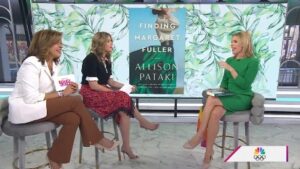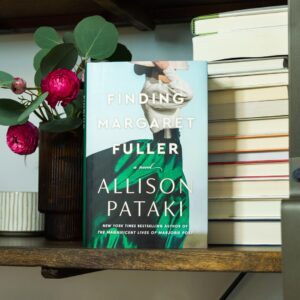What’s next? That’s the question that always comes up any time I speak with readers, booksellers, and reading groups.
I can now answer that question.
As many of you know, my husband Dave suffered a near fatal bithalamic stroke last June. He turned to me on an airplane, as we were flying to our “babymoon,” and told me he couldn’t see anything out of his right eye. A few minutes later, Dave lost consciousness. When that happened, the life we had planned for—baby on the way, Dave’s medical fellowship upcoming, my life as an author moving full steam ahead—went up in flames.
When Dave woke up after the stroke, aged 30, seemingly strong and outwardly intact, he could not carry memories from hour to hour, much less from one day to the next. I lost the Dave I knew and loved when he lost consciousness on that plane. So too did I lose the life that I thought I knew, the future I had planned for, and the version of myself who had boarded the plane.
The cruelest irony of the whole situation was that, while I was going through something as devastating as that experience was, my husband, my partner, was the one person to whom I most wanted to talk. Dave, the person who knew me better than anyone else in the world, was the person to whom I most needed to talk. But he wasn’t there. At least, not as himself.
So, I decided to write to him. I opened up my laptop and began typing, saving the word document as “DearDave.doc,” because that was how it began. I’d write it all down so that, if Dave ever came back to me, we could some day experience it together. He could know what he went through, what we went through, and we could, hopefully, heal together.
Also at that time, I was receiving a deluge of mail. People were sending prayers and letters and cards and emails and hand-written notes. Memories of Dave, messages of inspiration and hope, notes about the past and notes about the future. I collected every one of these notes and put them all in a big leather bound book that I called “Dave’s Book of Fan Mail.” Just as I took such strength from these words from loved ones, I hoped that these letters would help to trigger something in Dave as well. I relied on these words to help bring him out of the state of amnesia and to give him (and me) hope in the many long hours of hard work that lay before us.
Seven months later, in January, it was the depth of winter in Chicago. It was an incredibly difficult time for me and Dave and our little family. No longer in the initial aftermath of Dave’s acute health crisis, with all of the accompanying love and support and hope and adrenaline, we were spent. It was hard not to worry that Dave’s lingering deficits might in fact be here to stay, that they were predictive of where things might settle out. Perhaps we had gotten all the recovery we could expect. Perhaps we had reached the dreaded plateau. No one could tell us, because no one knew. By that time, we had a newborn. I had a book launch coming up. Those winter days were filled with shuttling to rehab and haggling with insurance companies and visiting doctors and paying bills. I was exhausted. When people marveled at how completely I had shed the baby weight I wanted to respond: it’s amazing what stress will do for the waistline.
A wise friend gave me some very good advice in that moment: go back and reread what you wrote right after the stroke. I was too close to the situation. Progress was now coming in hard-fought inches, as opposed to leaps, and I could no longer see it. But when I went back and reread about the days when Dave couldn’t stand up or hold a fork or tell me the date or even tell me that we were having a baby girl, I saw just how far we had come. There had been such cause for hope from the very beginning, and I had to force myself to keep that hope alive.
I began doing a sort of “written inventory.” I once again took to the written word to process just where we had come from, where we were currently, and where we still longed to go. I catalogued all of the notes to Dave and my letters and journal entries. I began journaling once more. It became my own personal therapy. It was a project that I hoped to someday share with Dave and our daughter.
Somewhere along the way, it turned into something bigger.
Part of how I coped with the lowest moments of this recovery was by reading a lot of memoir, a genre on which I had not previously focused much time or interest. That winter, I found myself drawing such strength from reading other people’s stories, taking inspiration from the fact that so many others had survived so many other difficult experiences. If they could do it, I could do it. We would do it.
In May I wrote a piece with Dave for The New York Times about our experience with the stroke and its rehabilitation. The response from readers was overwhelming. I received emails and letters that brought tears of many types to my eyes. That piece, combined with this writing project I’ve been working on over the past year, has turned into a full and complete memoir of our own story.
I never intended to write about this experience in any public way. As an author, I’d always thought of writing as the place where I found my joy. Writing was where I went to play. Writing required space and time and freedom, none of which I had after the stroke.
And yet, like all of my books so far, this project took me by surprise and wasn’t really a choice. The story grew over the course of the year following Dave’s stroke, but it became a story so much larger than simply the story of Dave’s stroke. Perhaps best of all, by the time I was wrapping up the project, Dave was in a position to jump in and help write the ending. I hope that in some way by sharing this we will be liberating the story, liberating Dave and me from this experience, and hopefully empowering others in the process.
It just might be the greatest challenge of my professional life, writing and sharing this book, but it might also have the power to do the most good. Writing, after all, is ultimately about connecting, isn’t it? It’s the writer connecting to what lies within, clamoring for emancipation. It’s the writer connecting with the reader, a sacred and intimate conversation. It’s the reader connecting with the truths and emotions that she has always known, perhaps without even realizing it. It’s one reader connecting to another reader, or perhaps simply to one’s self.
If this story can do that, if this book can connect to even one person, can provide any inspiration, any comfort, even just a single spear of sunlight from what began as a moment of total darkness, then it will be worth it.
So, my next year and a half are spoken for with these two projects. I couldn’t be more eager to roll up my sleeves and get to work. I still ask myself every day: I get to do this for work?
And on that note, I had better get to work! I’ll have more updates soon, and as always, I’ll be sharing them here first.
Until then, thank you so much for your friendship and your support. Happy reading!
Best wishes,
Allison




